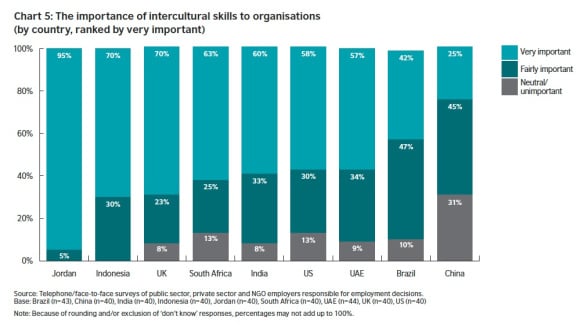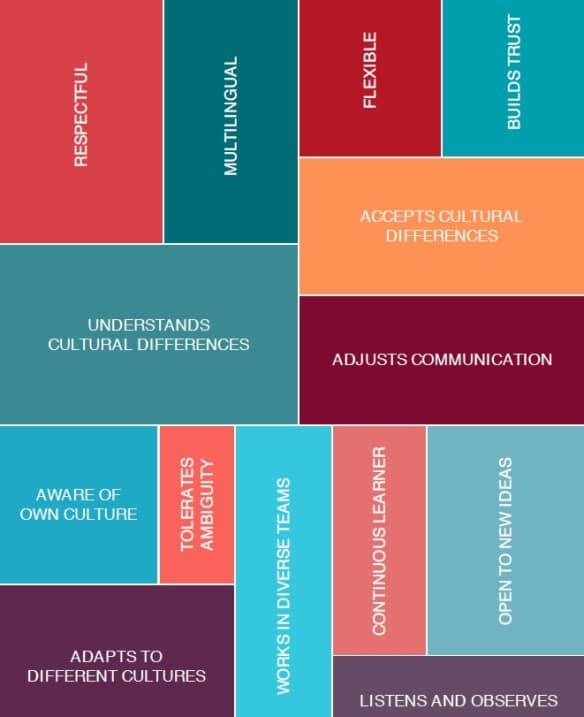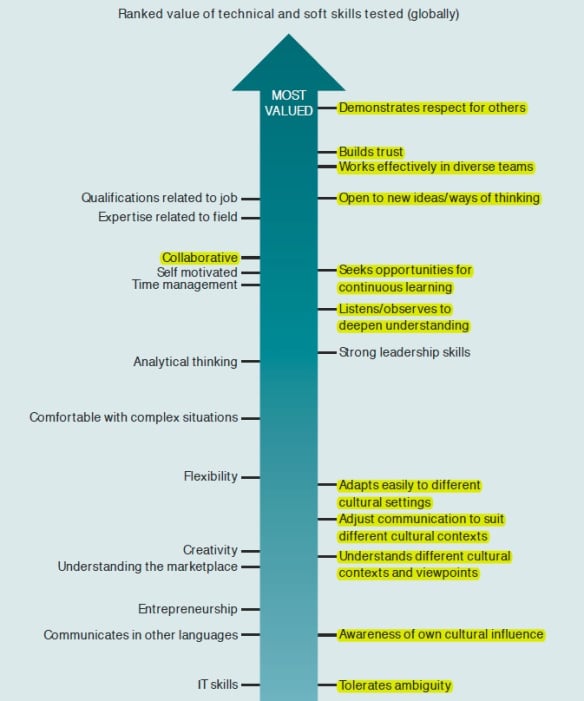Work: The value of intercultural skills in the workplace
—A survey conducted by the British Council, Booz Allen Hamilton and Ipsos Public Affairs, of HR managers at 367 large employers in nine countries: Brazil, China, India, Indonesia, Jordan, South Africa, the United Arab Emirates (UAE), the United Kingdom (UK), and the United States (US)
 Culture at
Culture at
The Report’s Conclusions
“Our ability to engage successfully with other countries, organisations and people will depend to a large extent on whether we possess the necessary intercultural and foreign language skills to make fruitful connections, whether in trade and investment, charity/NGO programmes or as government and international organisations. This is fundamentally changing the way in which employers value and seek to develop intercultural skills in the workplace.”
“More and more business leaders are identifying real business value in employing staff with intercultural skills. These skills are vital, not just in smoothing international business transactions, but also in developing long term relationships with customers and suppliers. Increasingly they also play a key role within the workplace, enhancing team working, fostering creativity, improving communication and reducing conflict. All this translates into greater efficiency, stronger brand identity, enhanced reputation and ultimately impact on the bottom line.”
“Employers believe that intercultural skills are integral to the workplace.”
“A common challenge shared by employers around the world is finding employees with adequate intercultural skills. Given that the operating environments of all organisations is increasingly global, it comes as no surprise that employers need employees who can understand and adapt to different cultural contexts.”
What is the international reality in the workplace?
The research shows that employees in most large companies surveyed engage in extensive interaction across international borders.
More than two thirds of employers report that their employees engage frequently with colleagues outside of their country, and over half say that their employees engage frequently with partners and clients outside of their country.

THE BUSINESS VALUE OF INTERCULTURAL SKILLS
Intercultural skills provide business value and help mitigate risk.The research shows that HR managers associate intercultural skills with significant business benefits. Overall, the organisations surveyed are most interested in intercultural skills for the benefits they bring—benefits that carry significant monetary value to employers:
- Keeping teams running efficiently
- Good for reputation
- Bringing in new clients
- Building trust with clients
- Communicating with overseas partners
- Able to work with diverse colleagues
- Increased productivity
- Increased sales
Employers also see significant risk to their organisations when employees lack intercultural skills. Top risks that organisations surveyed are concerned about are:
- Miscommunication and conflict within teams
- Global reputational damage
- Los of clients
- Cultural insensitivity to clients/partners overseas
- Project mistakes
How do the organisations surveyed define “intercultural skills”?
The graphic below shows the words employers used, with size of the block equating to frequency of use.

The terms employers use to define intercultural skills
Source: Telephone/face-to-face surveys of public sector, private sector and NGO employers responsible for employment decisions. Base: Ipsos Public Affairs, 2012: Global (n=367).
In particular, employers highlight the following as important intercultural skills that they look for in job candidates:
- the ability to understand different cultural contexts and viewpoints
- demonstrating respect for others
- accepting different cultural contexts and viewpoints
- openness to new ideas and ways of thinking
- knowledge of a foreign language.
How employers rank different skills in terms of importance
Graphic © the original report, with yellow highlights added by Cultural Detective.
How does the research indicate these skills are developed?
Most employers report encouraging their staff to develop intercultural skills through in-house training, meetings and events. However, employers also say that educational institutions could do more to equip students with intercultural skills.
The findings suggest that policy makers and education providers could do more to contribute to the development of a workforce with the necessary intercultural skills through interventions, such as prioritising:
- teaching communication skills
- offering foreign language classes
- availability of opportunities for students to gain international experience
- development of international research partnerships.
This research suggests that there is significant opportunity for employers, policy makers and education providers to work together to strengthen the development of intercultural skills to meet the needs of an increasingly global workforce.

